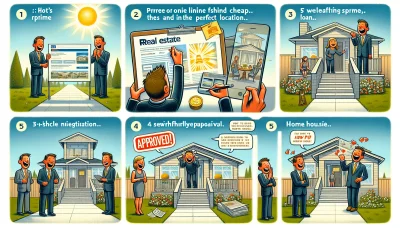Pros and cons of renting Quiz
Test Your Knowledge
Question of
Understanding Renting: A Comprehensive Overview
What is Renting?
Definition of Renting
Renting refers to the process whereby an individual, known as the tenant, pays a fee to another party, the landlord, for the use of a property, such as an apartment, house, or commercial space, for a specified period.
Renting vs. Homeownership
Renting differs from homeownership in that the tenant does not hold ownership of the property and is typically bound by the terms of a lease agreement. Homeownership involves purchasing a property, giving the owner full control over the premises, subject to any mortgage agreements or local laws.
Short-Term vs. Long-Term Rentals
Short-term rentals are typically for periods of a few days to several months and are often furnished, catering to vacationers or temporary residents. Long-term rentals, on the other hand, usually last for six months to several years, requiring tenants to often furnish the property themselves and commit to a longer lease agreement.
The Rise of Rental Markets
Economic Factors Influencing Rentals
Economic factors such as housing affordability, employment rates, and income levels significantly influence rental markets. High property prices in many urban areas make renting a more viable option for many individuals and families.
Demographic Trends in Renting
Demographic trends, including delayed marriage, higher rates of urbanization, and an increasing preference for flexibility, have contributed to a rise in the renting population. Young adults, in particular, are more likely to rent than previous generations at the same age.
Geographic Hotspots for Renters
Geographic hotspots for renters often include major cities and metropolitan areas where employment opportunities, educational institutions, and amenities attract a younger demographic. These areas typically see higher rental demand, influencing both availability and rental prices.
Financial Implications of Renting
Evaluating Rental Costs
- Monthly Rent Payments
- Security Deposits and Fees
- Utility and Maintenance Expenses
Long-Term Financial Considerations
- Renting and Credit Scores
- Opportunity Costs of Not Investing in Property
- Rent Increases and Inflation
Flexibility and Convenience Factors
The Flexibility of Leasing Terms
- Lease Duration Options : Offers a range of lease lengths to accommodate different needs, from short-term to long-term commitments.
- Breaking a Lease: Pros and Cons : Provides an option for early termination under certain conditions, weighing the potential financial penalties against personal circumstances.
- Subletting and Lease Transfer Possibilities : Allows for transferring the lease to another individual or subletting, offering flexibility in unpredictable situations.
Convenience for Lifestyle and Mobility
- Relocation Ease for Renters : Facilitates easier moves, especially beneficial for those with jobs requiring frequent relocation or personal preference for change.
- Access to Amenities and Services : Often includes access to facilities and services such as gyms, pools, and maintenance, enhancing living experiences without additional costs.
- Hassle-Free Maintenance and Repairs : Eliminates the need for renters to handle maintenance and repairs, providing a worry-free living environment.
Legal Rights and Responsibilities
Understanding Tenant Rights
Lease Agreements and Tenant Protections
Lease agreements are legal documents that outline the terms and conditions of the tenancy, including rent, duration, and the rights and responsibilities of both tenant and landlord. Tenant protections include laws that ensure fair treatment, non-discrimination, and access to a safe and habitable living environment.
Privacy and Quiet Enjoyment
Tenants have the right to privacy and quiet enjoyment of their rental unit. This means landlords must provide notice before entering the property, and cannot disturb the tenant's peace or use the property without permission.
Security Deposit Laws and Return Policies
Security deposit laws regulate the amount a landlord can charge, how it must be stored, and the timeline and conditions under which it must be returned to the tenant at the end of the lease.
Landlord Obligations and Interactions
Maintenance and Repairs Responsibilities
Landlords are responsible for maintaining the property in a habitable condition, making necessary repairs in a timely manner, and following health and safety codes.
Legal Obligations to Tenants
Landlords have legal obligations to their tenants, including ensuring the rental unit is habitable, respecting the tenant's rights, and adhering to local and federal housing laws.
Conflict Resolution and Dispute Management
Effective conflict resolution and dispute management strategies are essential for maintaining a positive landlord-tenant relationship. This includes open communication, understanding each party's rights, and seeking mediation or legal advice when necessary.
Pros of Renting: Weighing the Advantages
-
No Responsibility for Major Repairs
- Landlord Handles Structural Issues
- Appliance Repairs and Replacements
- Dealing with Emergencies and Natural Disasters
-
Amenities and Community Benefits
- Access to Fitness Centers, Pools, and Recreation Areas
- Community Events and Social Opportunities
- Additional Services like Security and Concierge
Cons of Renting: Potential Drawbacks to Consider
-
Lack of Property Control
- Restrictions on Customization and Renovations
- Pet Policies and Limitations
- Dealing with Neighbors and Noise Issues
-
Absence of Equity Building
- Rent Payments Don't Contribute to Ownership
- No Tax Benefits Linked to Property Taxes or Mortgage Interest
- Missing Out on Real Estate Appreciation












